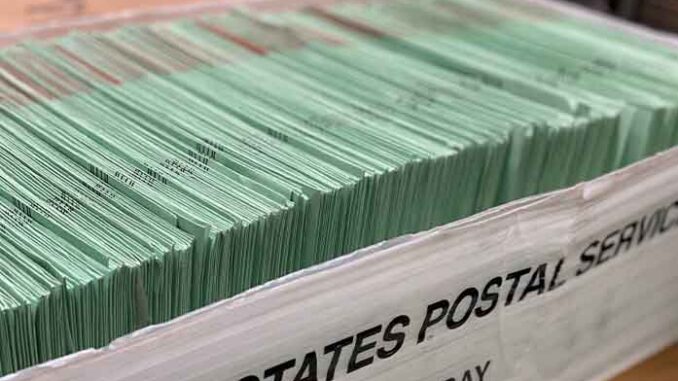
Whether Cochise County’s board of supervisors have authority to demand a hand count audit of all 35,000 early ballots expected to be cast in this month’s General Election is just one of the questions Judge Casey McGinley of the Pima County Superior Court must answer Monday, but the judge acknowledged his ruling won’t be the end of the legal challenge.
McGinley promised to rule on that question first thing Monday. If the full hand count is allowed of the estimated 40,000 ballots cast in Cochise County on either Election Day or cast on early ballots, then the judge must rule whether County Recorder David Stevens can oversee the activities as directed by the county board, or if it must be conducted by Elections Director Lisa Marra.
It is Marra who typically conducts the traditional post-election hand counts which involve only a few thousand of the ballots cast.
An evidentiary hearing conducted Nov. 4 left unclarified whether Marra would agree to conduct the full hand count. Marra, who unlike Stevens is a county employee and not an elected official, has expressed concerns with whether the board’s plans are legal.
Her testimony is in line with repeated comments by Cochise County Attorney Brian McIntyre that state law provides no authority for the full hand count of early ballots the county board wishes to do.
However, McGinley was told many times by attorneys for the supervisors and Stevens is that nothing in Arizona law specifically forbids an early ballot full hand count. To support their position, the judge was provided three documents from the Arizona Attorney General’s Office referring to allowable hand counts exceeding what is required in statute.
No matter what McGinley rules, he said he expects one or more of the parties to appeal. It is even possible that more than one side could seek a higher court’s involvement, depending on how the ruling breaks down.
That ruling will come one week after a legal challenge was filed against Cochise County’s three-member board, Marra, and Stevens by Arizona Alliance of Retired Americans, Inc. and local voter Stephani Stephenson. The lawsuit made several arguments against the full hand count of early ballots, ranging from a lack of authority under state law to the timing of the change in hand count plans so close to Election Day.
There was also concern expressed that the two supervisors -Tom Crosby and Peggy Judd- who support a full hand count would balk at accepting the machine tabulated vote counts in favor of the hand count totals.
Time is of the essence when it comes to hand counts, as state law requires each county to start the process by the end of the day Nov. 9, the day after the polls close. But starting the process does not necessarily mean starting the count of ballots.
Instead, the statute can be satisfied by simply having the participating county political party chairs randomly pick the four races that will be subject to the hand count. Then the actual counting of ballots can occur later, as long as it is finished in time for the county board to canvass its election results.
Roughly 80 percent of Cochise County votes are cast via early ballots. Marra testified she has been setting aside some batches of ballots each day toward the 700 needed for the traditional hand count. But that means ballots tabulated closer to Election Day are likely not subjected to the hand count.
A benefit of a full hand count of early ballots is that it ensures all tabulation results are audited, the supervisors’ attorney argued.
If McGinley rejects the board’s full hand count of early ballots, it is unclear whether county officials will go forward with a full hand count of voting center ballots.
State law sets different procedures for the hand counting of in-person voting on Election Day and of early ballots. Unlike early ballots, state law outlines a circumstance in which all election day ballots can be hand counted, although such a situation has never occurred in any county.
No one has challenged the Cochise County board’s decision to conduct a full hand count of all ballots cast in the county’s 17 voting centers instead of the usual 2 locations.
McIntyre, the Cochise County Attorney, kept his word and did not represent any of the county defendants named in the lawsuit. Instead, Marra was represented by Scottsdale-based Pierce Coleman PLLC.
Stevens was represented by Alexander Kolodin of Davillier Law Group, while the supervisors received their legal counsel from Bryan Blehm of Valley Law Group.
There have been questions raised about who will pick up the tab for the legal challenge as well as the expanded hand count, given that Crosby and Judd have spoken out in the past against accepting “outside” money for election activities.
RELATED ARTICLES:
Union-Affiliated Group Wants To Block Cochise County’s Full Hand Count Of Early Ballots
100 Percent Hand Count Plan Exposes Misinformation And Confusion
